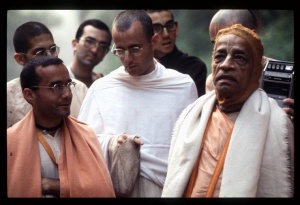SB 7.7.11: Difference between revisions
m (1 revision(s)) |
No edit summary |
||
| Line 1: | Line 1: | ||
{{info | {{info | ||
|speaker= | |speaker=Prahlāda Mahārāja | ||
|listener= | |listener=Prahlāda Mahārāja's school friends | ||
}} | }} | ||
[[Category:Srimad-Bhagavatam - Canto 07 Chapter 07]] | |||
[[Category:Bhagavatam Verses Spoken by Prahlada Maharaja - Vanisource|070711]] | |||
<div style="float:left">'''[[Srimad-Bhagavatam]] - [[SB 7|Seventh Canto]] - [[SB 7.7: What Prahlada Learned in the Womb|Chapter 7: What Prahlāda Learned in the Womb]]'''</div> | |||
<div style="float:right">[[File:Go-previous.png|link=SB 7.7.10]] '''[[SB 7.7.10]] - [[SB 7.7.12]]''' [[File:Go-next.png|link=SB 7.7.12]]</div> | |||
{{RandomImage}} | |||
==== TEXT 11 ==== | ==== TEXT 11 ==== | ||
<div | <div class="verse"> | ||
ity uktas tāṁ vihāyendro | :ity uktas tāṁ vihāyendro | ||
devarṣer mānayan vacaḥ | :devarṣer mānayan vacaḥ | ||
ananta-priya-bhaktyaināṁ | :ananta-priya-bhaktyaināṁ | ||
parikramya divaṁ yayau | :parikramya divaṁ yayau | ||
</div> | </div> | ||
| Line 17: | Line 22: | ||
==== SYNONYMS ==== | ==== SYNONYMS ==== | ||
<div | <div class="synonyms"> | ||
''iti''—thus; ''uktaḥ''—addressed; ''tām''—her; ''vihāya''—releasing; ''indraḥ''—the King of heaven; ''deva-ṛṣeḥ''—of the saint Nārada Muni; ''mānayan''—honoring; ''vacaḥ''—the words; ''ananta-priya''—for one who is very dear to the Supreme Personality of Godhead; ''bhaktyā''—by devotion; ''enām''—this (woman); ''parikramya''—circumambulating; ''divam''—to the heavenly planets; ''yayau''—returned. | |||
</div> | </div> | ||
| Line 24: | Line 29: | ||
==== TRANSLATION ==== | ==== TRANSLATION ==== | ||
<div | <div class="translation"> | ||
When the great saint Nārada Muni had thus spoken, King Indra, being respectful to Nārada's words, immediately released my mother. Because of my being a devotee of the Lord, all the demigods circumambulated her. Then they returned to their celestial kingdom. | When the great saint Nārada Muni had thus spoken, King Indra, being respectful to Nārada's words, immediately released my mother. Because of my being a devotee of the Lord, all the demigods circumambulated her. Then they returned to their celestial kingdom. | ||
</div> | </div> | ||
| Line 31: | Line 36: | ||
==== PURPORT ==== | ==== PURPORT ==== | ||
<div | <div class="purport"> | ||
Although King Indra and the other demigods are exalted personalities, they were so obedient to Nārada Muni that King Indra immediately accepted Nārada Muni's words concerning Prahlāda Mahārāja. This is called understanding by the paramparā system. Indra and the demigods did not know that a great devotee was in the womb of Kayādhu, the wife of Hiraṇyakaśipu, but they accepted the authoritative statements of Nārada Muni and immediately offered their respects to the devotee by circumambulating the woman in whose womb he was living. To understand God and the devotee by the paramparā system is the process of knowledge. There is no need to speculate about God and His devotee. One should accept the statements of a bona fide devotee and thus try to understand. | Although King Indra and the other demigods are exalted personalities, they were so obedient to Nārada Muni that King Indra immediately accepted Nārada Muni's words concerning Prahlāda Mahārāja. This is called understanding by the ''paramparā'' system. Indra and the demigods did not know that a great devotee was in the womb of Kayādhu, the wife of Hiraṇyakaśipu, but they accepted the authoritative statements of Nārada Muni and immediately offered their respects to the devotee by circumambulating the woman in whose womb he was living. To understand God and the devotee by the ''paramparā'' system is the process of knowledge. There is no need to speculate about God and His devotee. One should accept the statements of a bona fide devotee and thus try to understand. | ||
</div> | </div> | ||
__NOTOC__ | |||
<div style="float:right; clear:both;">[[File:Go-previous.png|link=SB 7.7.10]] '''[[SB 7.7.10]] - [[SB 7.7.12]]''' [[File:Go-next.png|link=SB 7.7.12]]</div> | |||
__NOTOC__ | |||
__NOEDITSECTION__ | |||
Revision as of 09:57, 31 May 2021

A.C. Bhaktivedanta Swami Prabhupada
TEXT 11
- ity uktas tāṁ vihāyendro
- devarṣer mānayan vacaḥ
- ananta-priya-bhaktyaināṁ
- parikramya divaṁ yayau
SYNONYMS
iti—thus; uktaḥ—addressed; tām—her; vihāya—releasing; indraḥ—the King of heaven; deva-ṛṣeḥ—of the saint Nārada Muni; mānayan—honoring; vacaḥ—the words; ananta-priya—for one who is very dear to the Supreme Personality of Godhead; bhaktyā—by devotion; enām—this (woman); parikramya—circumambulating; divam—to the heavenly planets; yayau—returned.
TRANSLATION
When the great saint Nārada Muni had thus spoken, King Indra, being respectful to Nārada's words, immediately released my mother. Because of my being a devotee of the Lord, all the demigods circumambulated her. Then they returned to their celestial kingdom.
PURPORT
Although King Indra and the other demigods are exalted personalities, they were so obedient to Nārada Muni that King Indra immediately accepted Nārada Muni's words concerning Prahlāda Mahārāja. This is called understanding by the paramparā system. Indra and the demigods did not know that a great devotee was in the womb of Kayādhu, the wife of Hiraṇyakaśipu, but they accepted the authoritative statements of Nārada Muni and immediately offered their respects to the devotee by circumambulating the woman in whose womb he was living. To understand God and the devotee by the paramparā system is the process of knowledge. There is no need to speculate about God and His devotee. One should accept the statements of a bona fide devotee and thus try to understand.